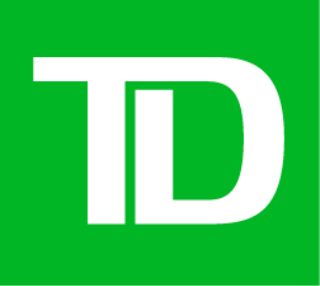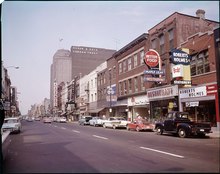Washington Mutual was the United States' largest savings and loan association until its collapse in 2008.

Toronto-Dominion Bank, doing business as TD Bank Group, is a Canadian multinational banking and financial services corporation headquartered in Toronto, Ontario. The bank was created on February 1, 1955, through the merger of the Bank of Toronto and The Dominion Bank, which were founded in 1855 and 1869; respectively. It is one of two Big Five banks of Canada founded in Toronto, the other being the Canadian Imperial Bank of Commerce. The TD Bank SWIFT code is TDOMCATTTOR and the TD institution number is 004.

TD Canada Trust, frequently shortened to simply TD, is the commercial banking operation of TD Bank Group in Canada. TD Canada Trust offers a range of financial services and products to more than 10 million Canadian customers through more than 1,100 branches and 2,600 ATMs. It is the second-largest commercial bank in Canada by assets, behind only RBC.

Royal Bank of Canada is a Canadian multinational financial services company and the largest bank in Canada by market capitalization. The bank serves over 17 million clients and has more than 89,000 employees worldwide. Founded in 1864 in Halifax, Nova Scotia, it maintains a corporate headquarters in Toronto and its head office in Montreal. RBC's institution number is 003. In November 2017, RBC was added to the Financial Stability Board's list of global systemically important banks.
Big Five is the name colloquially given to the five largest banks that dominate the banking industry of Canada: Bank of Montreal (BMO), Bank of Nova Scotia (Scotiabank), Canadian Imperial Bank of Commerce (CIBC), Royal Bank of Canada (RBC), and Toronto-Dominion Bank (TD).
Manulife Bank of Canada is a wholly owned subsidiary of Manulife. As a direct bank, it offers high-interest chequing & savings accounts, credit cards, lines of credit and mortgages, including Manulife One. Since it was established in 1993, Manulife Bank has grown to more than $29 billion in assets and serves customers across Canada. Manulife Bank headquarters are in Waterloo, Ontario.

President's Choice Financial, commonly shortened to PC Financial, is the financial service brand of the Canadian supermarket chain Loblaw Companies.
A trust company is a corporation that acts as a fiduciary, trustee or agent of trusts and agencies. A professional trust company may be independently owned or owned by, for example, a bank or a law firm, and which specializes in being a trustee of various kinds of trusts.

The Canada Deposit Insurance Corporation is a Canadian federal Crown Corporation created by Parliament in 1967 to provide deposit insurance to depositors in Canadian commercial banks and savings institutions. CDIC insures Canadians' deposits held at Canadian banks up to C$100,000 in case of a bank failure. CDIC automatically insures many types of savings against the failure of a financial institution. However, the bank must be a CDIC member and not all savings are insured. CDIC is also Canada's resolution authority for banks, federally regulated credit unions, trust and loan companies as well as associations governed by the Cooperative Credit Associations Act that take deposits.

National City Corporation was a regional bank holding company based in Cleveland, Ohio, USA, founded in 1845; it was once one of the ten largest banks in America in terms of deposits, mortgages and home equity lines of credit. Subsidiary National City Mortgage is credited for doing the first mortgage in America. The company operated through an extensive banking network primarily in Ohio, Illinois, Indiana, Kentucky, Michigan, Missouri, Pennsylvania, Florida, and Wisconsin, and also served customers in selected markets nationally. Its core businesses included commercial and retail banking, mortgage financing and servicing, consumer finance, and asset management. The bank reached out to customers primarily through mass advertising and offered comprehensive banking services online. In its last years, the company was commonly known in the media by the abbreviated NatCity, with its investment banking arm even bearing the official name NatCity Investments.
TD Banknorth, formerly Banknorth, was a wholly owned subsidiary of the Toronto-Dominion Bank which conducted banking and insurance activities, primarily serving the northeastern area of the United States, headquartered in Portland, Maine. The bank became TD Bank, N.A. on May 31, 2008.
First Horizon Corporation, formerly First Tennessee Bank, is a financial services company, founded in 1864, and based in Memphis, Tennessee. Through its banking subsidiary First Horizon Bank, it provides financial services through locations in 12 states across the Southeast, a region in which it is the fourth largest regional bank.
H.F. Ahmanson & Co. was a California holding company named after Howard F. Ahmanson Sr. It was best known as the parent of Home Savings of America, once one of the largest savings and loan associations in the United States.

Banking in Canada is one of Canada's most important industries with several banks being among its largest and most profitable companies.

The R & G Financial Corporation was a financial holding company located in San Juan, Puerto Rico. On April 30, 2010, its bank failed and its deposits and assets were seized by the Federal Deposit Insurance Corporation (FDIC). Its deposits and assets were subsequently sold to Scotiabank. On May 14, R & G Financial Corporation filed for Chapter 11 bankruptcy.

Trustco Bank is a commercial bank within the United States. Trustco was founded in Schenectady, New York in 1902 and is headquartered in Glenville, New York. Trustco has 145 branches spread among New York, Florida, Massachusetts, New Jersey, and Vermont. Trustco Bank is an Equal Housing Lender and an Insured member of the Federal Deposit Insurance Corporation. The company operates under the slogan, "Your Home Town Bank."
Tangerine Bank is a Canadian direct bank that is a subsidiary of Scotiabank. It offers no-fee chequing and savings accounts, Guaranteed Investment Certificates (GICs), mortgages and mutual funds. Many savings and investment products are eligible for registration under a Tax-Free Savings Account (TFSA), Registered Retirement Savings Plan (RRSP) or Registered Retirement Income Fund (RRIF).
Lloyds Bank California was a wholly owned subsidiary of Lloyds Bank Plc in the United Kingdom from 1974 to 1986. Throughout its existence, the U.S. retail banking operation functioned as an autonomous unit of the Lloyds Bank Group, alongside Lloyds Bank International and the National Bank of New Zealand.
Equitable Bank is a Canadian bank which primarily provides residential and commercial real estate lending services, as well as personal banking through its direct banking brand EQ Bank. The bank was founded in 1970 as The Equitable Trust Company and became a Schedule I Bank offering savings products in 2013. As of 2022, it is Canada's seventh largest bank, with nearly $103 billion in assets under management. As of February 2023, the bank had over $31 billion in deposits. Equitable Bank is a member of the Canada Deposit Insurance Corporation.
A routing number is the term for bank codes in Canada. Routing numbers consist of eight numerical digits with a dash between the fifth and sixth digit for paper financial documents encoded with magnetic ink character recognition and nine numerical digits without dashes for electronic funds transfers. Routing numbers are regulated by Payments Canada, formerly known as the Canadian Payments Association, to allow easy identification of the branch location and financial institution associated with an account.











